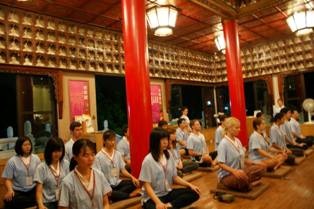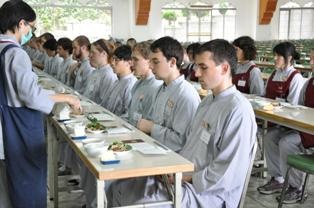Humble Table, Wise Fare
Tolerate---
the existence of the dissident,
the dignity of the maimed and disabled,
the harm of the enemy,
the unintentional mistake.
News
Fo Guang Shan launches the English weekend retreats
“A weekend of peace, tranquility, and self-discovery awaits program participants,” said Miao Guang, a Fo Guang Shan Monastery monk, in a June 11 interview with Taiwan Today.
“Weekend retreats are a great way to initiate an exploration of Buddhism. Here, one can shut out the noise and distractions to embark on a personal journey of introspection.”
Conducted in English at the Fo Guang Shan Monastery in Kaohsiung City, activities designed for Buddhist newbies include chanting, praying, dharma classes, Q&A sessions, meditation, calligraphy, vegetarian cooking, and a tour of the temple and nearby memorial center.
Starting May, retreats are scheduled for the second weekend of each month throughout the year, Miao Guang said, adding that participants pay NT$500 (US$17) per retreat upon registration, with those attending four retreats receiving a full refund of fees.
The first two sessions were a great success, Miao Guang said, attracting participants from 12 countries such as Australia, Canada, Czech Republic, Indonesia, Germany, New Zealand, Philippines, Singapore, Thailand, the U.K., U.S. and Vietnam.
“Any English speaker aged between 18 and 40 interested in Buddhism is welcome to take the spiritual path, finding greater depth and intensity of spiritual practice,” Miao Guang said.
“It is hoped that through experiencing life in the temple, participants will better understand the true meaning of dharma that exists in every aspect of daily life.”
Singapore-born Sarah Chua, who studies at the University of Southern California, enrolled in the first session in May and was back to work as a volunteer in June. Chua said she knew nothing about Buddhism before attending the event but was impressed by the power of meditation.
“I learnt to clear out all thoughts during meditation and felt inner peace and calmness,” she said.
Another program aimed at promoting foreigners’ understanding of Buddhism is the International Youth Seminar on Life and Ch’an, according to Miao Guang. Scheduled for Aug. 1-14, the event serves as an exchange platform for outstanding youths aged 18 to 35 worldwide, she said.
The event, now in its fourth year, is open to 1,200 students from 400 universities in 40 countries. Participants are encouraged to embrace an attitude of service, mutual assistance and cooperating with others through discussion in various topics such as culture, education, environment and spirituality.
Miao Guang said Ch’an is a traditional Chinese form of Buddhism that emphasizes dharma practices and meditation. It has a significant following in Hong Kong, South Korea, Taiwan, Vietnam and many overseas Chinese communities, she added.
There are also panel discussions on how Buddhist teachings can be used to maintain physical and mental well-being through realization of the connections among all living beings and the environment, Miao Guang said.
“Participants are also introduced to the Buddhist perspectives on life and death as well as beliefs and practices relating to living and dying.
“They will learn how the wisdom of ancient Ch’an masters is applied in daily chores and services that are carried out in the Buddhist monastery. Additionally, participants will learn how Buddhist practices can be applied to daily life.”
Another key first week activity includes a cultural, historical, and religious tour of Taiwan. Participants visit a number of Buddhist sites nationwide to help develop a better understanding of the religion’s practices in different regions of Taiwan.
Trips to important tourist attractions, including national scenic and recreational areas, cultural museums and night markets, are also on the agenda. These permit participants to experience the natural beauty of Taiwan, while providing them with an overview of the country’s cultural and historical uniqueness, as well as world-renowned gourmet food.
For the second week, selected participants will have the opportunity to attend a weeklong meditation retreat, during which they will receive advanced training, experience monastic life and live like a monk.
The program is free of charge with accommodation, food and seminar fees sponsored by the organizers, Miao Guang said, adding that participants must pay their own way to the temple.
“They all came with an open mind, which made it easier for them to be immersed in Buddhism.” (JSM)
Those interested in experiencing life as a Buddhist monk now have the chance following the launch of a Weekend Temple Retreats program by Taiwan’s Fo Guang Shan Monastery.
Designed for foreign nationals to learn about Buddhism, the initiative also helps participants undergo a journey of spiritual discovery.
“A weekend of peace, tranquility, and self-discovery awaits program participants,” said Miao Guang, a Fo Guang Shan Monastery monk, in a June 11 interview with Taiwan Today.
“Weekend retreats are a great way to initiate an exploration of Buddhism. Here, one can shut out the noise and distractions to embark on a personal journey of introspection.”
Conducted in English at the Fo Guang Shan Monastery in Kaohsiung City, activities designed for Buddhist newbies include chanting, praying, dharma classes, Q&A sessions, meditation, calligraphy, vegetarian cooking, and a tour of the temple and nearby memorial center.
Starting May, retreats are scheduled for the second weekend of each month throughout the year, Miao Guang said, adding that participants pay NT$500 (US$17) per retreat upon registration, with those attending four retreats receiving a full refund of fees.
The first two sessions were a great success, Miao Guang said, attracting participants from 12 countries such as Australia, Canada, Czech Republic, Indonesia, Germany, New Zealand, Philippines, Singapore, Thailand, the U.K., U.S. and Vietnam.
“Any English speaker aged between 18 and 40 interested in Buddhism is welcome to take the spiritual path, finding greater depth and intensity of spiritual practice,” Miao Guang said.
“It is hoped that through experiencing life in the temple, participants will better understand the true meaning of dharma that exists in every aspect of daily life.”
Robin Chen, a Chinese-American graduate student in teaching English as a second language, said she signed up for the program because she was deeply moved by the temple’s cultural, education and philanthropy programs.
Singapore-born Sarah Chua, who studies at the University of Southern California, enrolled in the first session in May and was back to work as a volunteer in June. Chua said she knew nothing about Buddhism before attending the event but was impressed by the power of meditation.
“I learnt to clear out all thoughts during meditation and felt inner peace and calmness,” she said.
Another program aimed at promoting foreigners’ understanding of Buddhism is the International Youth Seminar on Life and Ch’an, according to Miao Guang. Scheduled for Aug. 1-14, the event serves as an exchange platform for outstanding youths aged 18 to 35 worldwide, she said.
The event, now in its fourth year, is open to 1,200 students from 400 universities in 40 countries. Participants are encouraged to embrace an attitude of service, mutual assistance and cooperating with others through discussion in various topics such as culture, education, environment and spirituality.
Miao Guang said Ch’an is a traditional Chinese form of Buddhism that emphasizes dharma practices and meditation. It has a significant following in Hong Kong, South Korea, Taiwan, Vietnam and many overseas Chinese communities, she added.
There are also panel discussions on how Buddhist teachings can be used to maintain physical and mental well-being through realization of the connections among all living beings and the environment, Miao Guang said.
“Participants are also introduced to the Buddhist perspectives on life and death as well as beliefs and practices relating to living and dying.
“They will learn how the wisdom of ancient Ch’an masters is applied in daily chores and services that are carried out in the Buddhist monastery. Additionally, participants will learn how Buddhist practices can be applied to daily life.”
Another key first week activity includes a cultural, historical, and religious tour of Taiwan. Participants visit a number of Buddhist sites nationwide to help develop a better understanding of the religion’s practices in different regions of Taiwan.
Trips to important tourist attractions, including national scenic and recreational areas, cultural museums and night markets, are also on the agenda. These permit participants to experience the natural beauty of Taiwan, while providing them with an overview of the country’s cultural and historical uniqueness, as well as world-renowned gourmet food.
For the second week, selected participants will have the opportunity to attend a weeklong meditation retreat, during which they will receive advanced training, experience monastic life and live like a monk.
The program is free of charge with accommodation, food and seminar fees sponsored by the organizers, Miao Guang said, adding that participants must pay their own way to the temple.
“We found that the young people had no problem adjusting to temple life, and they genuinely enjoyed finding inner peace through activities such as meditation and silence,” Miao Guang said.
“They all came with an open mind, which made it easier for them to be immersed in Buddhism.” (JSM)
OTHER LINKS:
OTHER LINKS:






